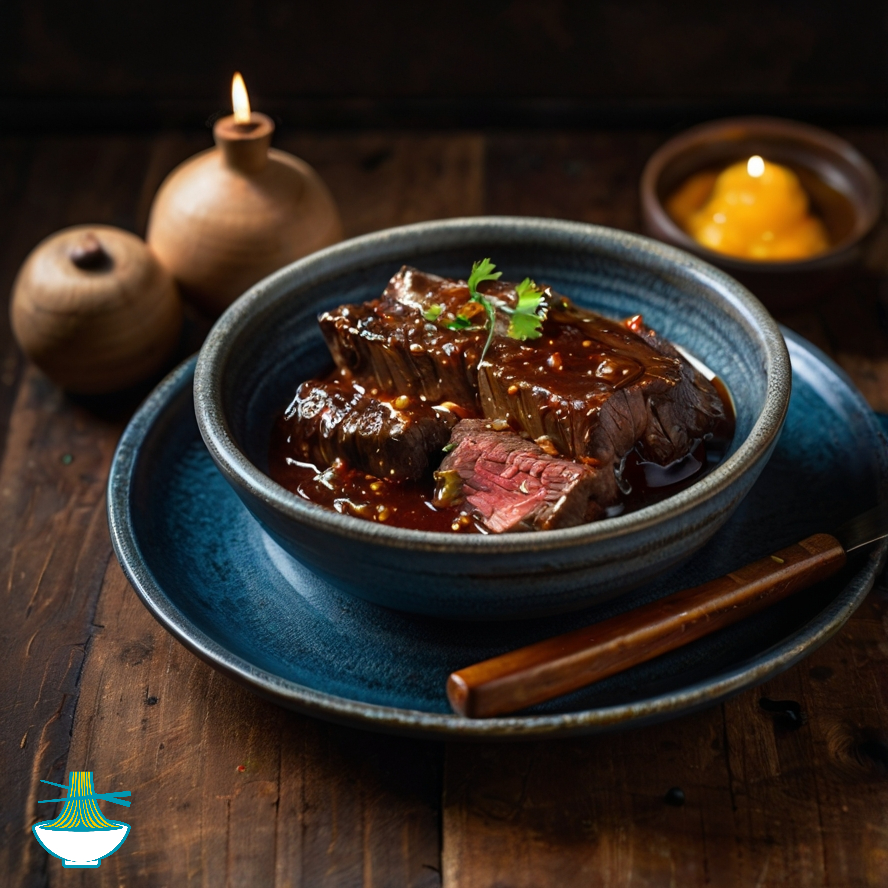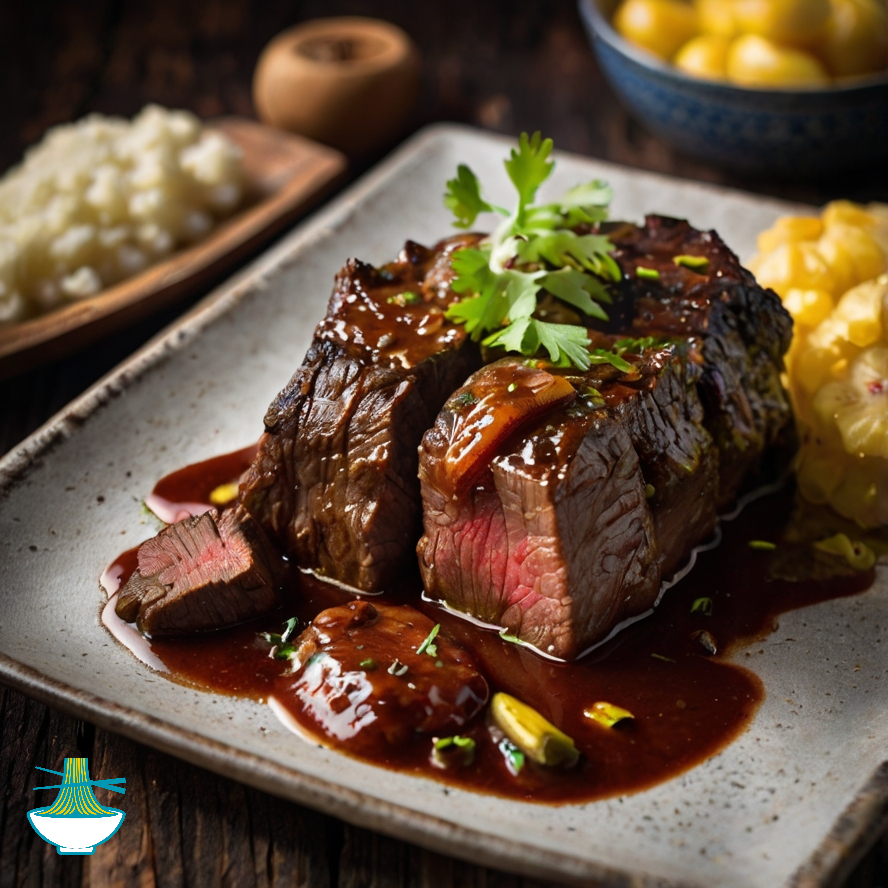Asado Negro or Grilled Beef or Barbecue a traditional Venezuelan dish featuring braised beef cooked in a rich and savory sweetsauce made from caramelized sugar.
The dish is known for its deep, complex flavors that result from slow cooking the beef until tender and infusing it with the caramel sauce.
The history of Asado Negro traces back to Venezuela's culinary heritage, where it has been enjoyed for generations as a special occasion meal. It is often served during holidays and family gatherings, showcasing the country's love for hearty and flavorful dishes. The caramelization process used in making the sauce adds a unique sweetness and depth to the tender beef, creating a deliciously indulgent dish that delights the senses.
Ingredients:
- 2 pounds beef (such as chuck roast), cut into chunks
- 2 tablespoons vegetable oil
- 1 cup sugar
- 1 onion, finely chopped
- 2 cloves garlic, minced
- 1 bell pepper, diced
- 1 teaspoon ground cumin
- 1 teaspoon paprika
- Salt and pepper to taste
- 2 cups beef broth or water
Method of Preparation:
1. Heat the vegetable oil in a large pot over medium-high heat.
2. Season the beef chunks with salt and pepper, then brown them in the pot until golden brown on all sides. Remove and set aside.
3. In the same pot, add the sugar and cook, stirring constantly, until it caramelizes and turns golden brown.
4. Add the onion, garlic, and bell pepper to the caramelized sugar. Cook until softened.
5. Stir in the ground cumin, paprika, salt, and pepper.
6. Return the beef to the pot and add enough beef broth or water to cover the meat.
7. Bring to a boil, then reduce the heat to low, cover, and simmer for about 2-3 hours or until the beef is tender and the sauce has thickened.
8. Serve the Asado Negro hot with rice or mashed potatoes.
Nutrition Value:
1. Beef (such as chuck roast):
- Calories: Approximately 1,800 calories for 2 pounds.
- Carbohydrates: Negligible (less than 1 gram).
- Protein: About 220 grams.
- Fat: Around 90 grams.
- Sodium: Varies depending on the cut, but generally around 200-300 milligrams per 3-ounce serving.
- Cholesterol: Approximately 300-400 milligrams per 3-ounce serving.
- Vitamins and Minerals: High in B vitamins (especially B12), zinc, iron, and selenium.
- Nutritional Benefits: Beef is an excellent source of high-quality protein and essential nutrients like iron, which is crucial for red blood cell formation, and zinc, which supports immune function and wound healing.
2. Vegetable Oil:
- Calories: About 240 calories for 2 tablespoons.
- Carbohydrates: Negligible (less than 1 gram).
- Protein: Negligible (less than 1 gram).
- Fat: About 28 grams, primarily unsaturated fats.
- Sodium: Negligible.
- Cholesterol: Negligible.
- Vitamins and Minerals: May contain small amounts of vitamin E.
- Nutritional Benefits: Provides essential fatty acids and can help with the absorption of fat-soluble vitamins.
3. Sugar:
- Calories: About 770 calories for 1 cup.
- Carbohydrates: Approximately 200 grams.
- Protein: Negligible (less than 1 gram).
- Fat: Negligible.
- Sodium: Negligible.
- Cholesterol: Negligible.
- Vitamins and Minerals: No significant vitamins or minerals.
- Nutritional Benefits: Provides quick energy but should be consumed in moderation due to its high-calorie content and impact on blood sugar levels.
4. Onion:
- Calories: About 40 calories per medium-sized onion.
- Carbohydrates: Approximately 10 grams.
- Protein: About 1 gram.
- Fat: Negligible.
- Sodium: Around 5 milligrams.
- Cholesterol: Negligible.
- Vitamins and Minerals: High in vitamin C, vitamin B6, potassium, and folate.
- Nutritional Benefits: Onions are rich in antioxidants and can support heart health and immune function.
5. Garlic:
- Calories: About 5 calories per clove.
- Carbohydrates: Approximately 1 gram per clove.
- Protein: Negligible (less than 1 gram).
- Fat: Negligible.
- Sodium: Negligible.
- Cholesterol: Negligible.
- Vitamins and Minerals: Contains vitamin C, vitamin B6, manganese, and selenium.
- Nutritional Benefits: Garlic is known for its potential immune-boosting and anti-inflammatory properties.
6. Bell Pepper:
- Calories: About 30 calories per medium-sized bell pepper.
- Carbohydrates: Approximately 7 grams.
- Protein: About 1 gram.
- Fat: Negligible.
- Sodium: Around 2 milligrams.
- Cholesterol: Negligible.
- Vitamins and Minerals: High in vitamin C, vitamin A, vitamin B6, and potassium.
- Nutritional Benefits: Bell peppers are rich in antioxidants and can support eye health, skin health, and immune function.
7. Ground Cumin:
- Calories: About 8 calories per teaspoon.
- Carbohydrates: Approximately 1 gram per teaspoon.
- Protein: About 0.5 grams per teaspoon.
- Fat: Negligible.
- Sodium: Around 1 milligram.
- Cholesterol: Negligible.
- Vitamins and Minerals: Contains small amounts of iron and manganese.
- Nutritional Benefits: Cumin is known for its digestive health benefits and may have anti-inflammatory properties.
8. Paprika:
- Calories: About 6 calories per teaspoon.
- Carbohydrates: Approximately 1 gram per teaspoon.
- Protein: Negligible (less than 1 gram).
- Fat: Negligible.
- Sodium: Around 1 milligram.
- Cholesterol: Negligible.
- Vitamins and Minerals: Contains vitamin A, vitamin E, vitamin B6, and potassium.
- Nutritional Benefits: Paprika is rich in antioxidants and may support heart health and immune function.
9. Salt and Pepper:
- Calories: Negligible.
- Carbohydrates: Negligible.
- Protein: Negligible.
- Fat: Negligible.
- Sodium: Depends on the amount used; should be used in moderation.
- Cholesterol: Negligible.
- Vitamins and Minerals: No significant vitamins or minerals.
- Nutritional Benefits: Salt adds flavor, but excessive intake can contribute to high blood pressure. Pepper adds flavor without calories and may have antioxidant properties.
10. Beef Broth or Water:
- Calories: If using beef broth, it can add around 15-20 calories per cup.
- Carbohydrates: Around 1-2 grams per cup, primarily from natural sugars in the broth.
- Protein: Around 1-2 grams per cup, mainly from the beef broth.
- Fat: Negligible.
- Sodium: Varies depending on the broth, but typically around 600-900 milligrams per cup.
- Cholesterol: May contain small amounts of cholesterol, especially if using store-bought broth.
- Vitamins and Minerals: Beef broth can provide additional nutrients like iron, potassium, and various B vitamins.
- Nutritional Benefits: Beef broth adds flavor and nutrients to the dish, but homemade broth or low-sodium options are preferable to reduce sodium intake.


Comments